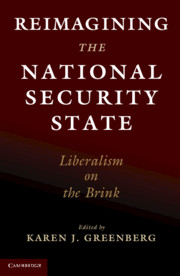Book contents
- Reimagining The National Security State
- Reimagining The National Security State
- Copyright page
- Contents
- Contributors
- Foreword
- Acknowledgments
- A Note from the Editor
- Part I The National Security State in Perspective
- Part II Tracking the Decline of Liberalism
- Part III The Future Imagined
- 9 Beyond the Counterinsurgency Paradigm of Governing: Letting Go of Prediction and the Illusion of an Internal Enemy
- 10 Reestablishing the Rule of Law as National Security
- 11 Rethinking the National Security State from an Evolutionary Perspective: A Reconnaissance
- After Thought
- Notes
- Select Bibliography
- Index
After Thought
from Part III - The Future Imagined
Published online by Cambridge University Press: 25 October 2019
- Reimagining The National Security State
- Reimagining The National Security State
- Copyright page
- Contents
- Contributors
- Foreword
- Acknowledgments
- A Note from the Editor
- Part I The National Security State in Perspective
- Part II Tracking the Decline of Liberalism
- Part III The Future Imagined
- 9 Beyond the Counterinsurgency Paradigm of Governing: Letting Go of Prediction and the Illusion of an Internal Enemy
- 10 Reestablishing the Rule of Law as National Security
- 11 Rethinking the National Security State from an Evolutionary Perspective: A Reconnaissance
- After Thought
- Notes
- Select Bibliography
- Index
Summary
The chapters presented in this volume inform us about the many dimensions of national security in this transformative time. An overriding question emerges about how a national security state can effectively protect the citizens and institutions of a liberal democracy from perceived threats. But the conversation becomes challenging and unfocused when tactics such as torture, indefinite detention, extraordinary rendition, secret government surveillance, and Muslim bans are put forth as necessary to counter contemporary threats. Not only are these practices declared necessary, but such national security methods are open-ended and expansive. Enemies of the nation are global but often stateless and perceived to be actively planning attacks on the homeland motivated by their hatred of our values. The mission creep of the Global War on Terror is the preservation of the much maligned but still accepted Dick Cheney 1% doctrine of preparing for the unknown but known 1% possibility of a credible threat. The message is clear: This is a new reality, get used to it. Vigilance is paramount even if liberal notions of freedom of speech, religious tolerance, presumption of innocence, and constitutional restraints on an overreaching government are somewhat abridged.
- Type
- Chapter
- Information
- Reimagining the National Security StateLiberalism on the Brink, pp. 185 - 186Publisher: Cambridge University PressPrint publication year: 2019

